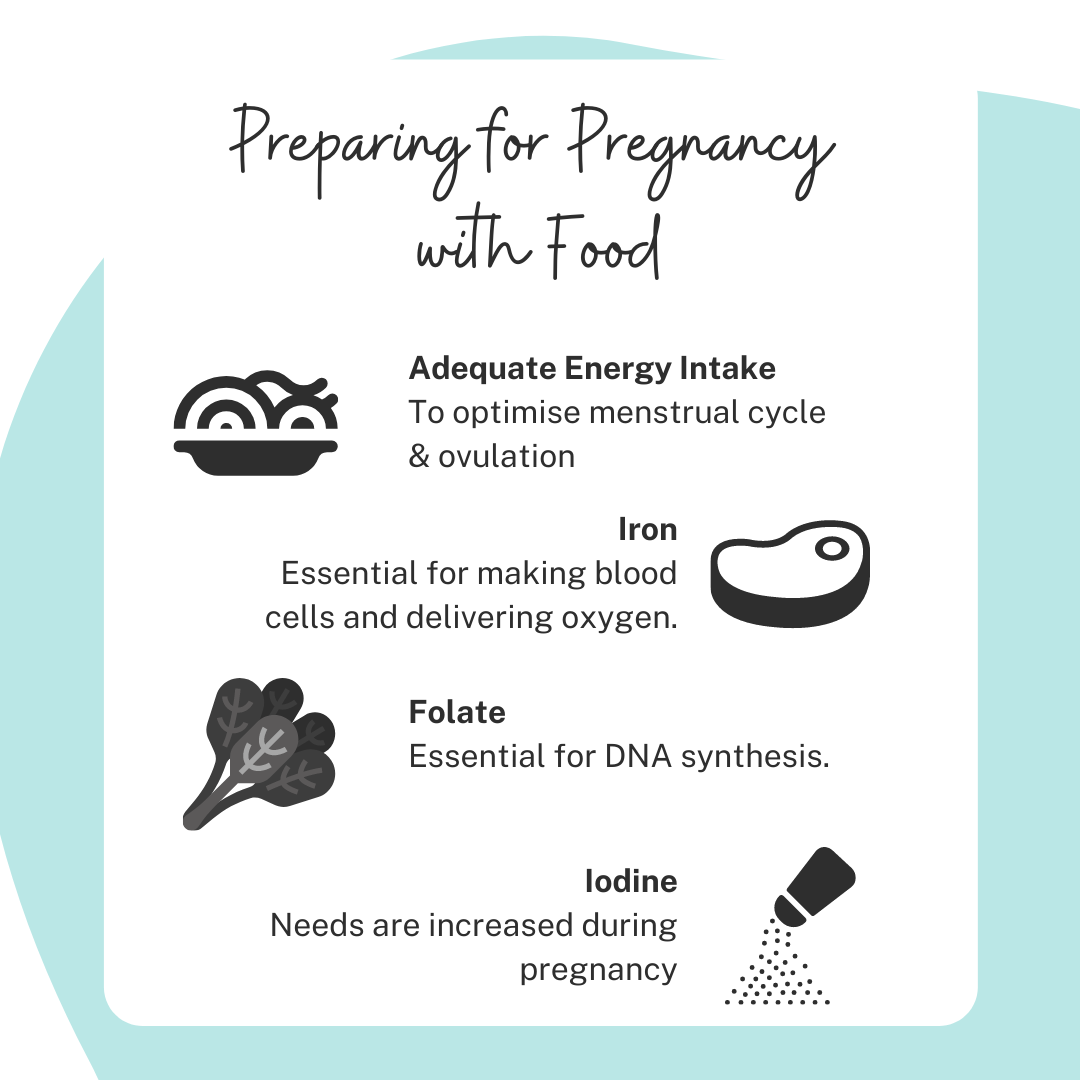Fuelling Your Fertility & Pregnancy: Athlete Nutrition Part 1
Aug 18, 2020
Alicia Edge, Advanced Sports Dietician
Access and acceptance of woman in sport is growing more than ever before, and there is another trend rising alongside it – more athletes becoming mums! The best part is, that where previously these new mums may have exited their sport, they are now returning to training, sport and competition. So how can nutrition support you not only in falling pregnant and during pregnancy, but also postpartum as an athletic mama?
Hatch is delighted to explore this with Alicia Edge, Advanced Sports Dietician, in an exclusive two part series. So that no matter what part of the journey you are on, you will be able to action some of the key things in food that can help you to progress.
Part One: practical nutrition considerations for fertility and during pregnancy
Wanting to Fall Pregnant, but Irregular/No Period? What Next?
One thing that tends to get swept aside in sport as a ‘norm’ is an irregular or absent menstrual cycle. Even if we approach our GP about it, many will simply retort that it is normal for athletes or not something to worry about until we want to start a family. However, the truth is, that even if fertility isn’t yet on your radar, one day it may be – and an absent period isn’t only a concern for fertility – it can also have impacts to your performance and your bone strength long-term.
Within the athlete population, the two most common causes of an irregular menstrual cycle are Polycystic Ovary Syndrome (PCOS) &/or Hypothalamic Amenorrhea (HA) due to Relative Energy Deficiency in Sport (REDS) caused by being in a state of Low Energy Availability (LEA). As such, if your period has been missing for more than 3 months, or is highly irregular with a lengthened cycle, it is best to follow up with a sports doctor, and then work with a Sports Dietitian for management.

If your irregular cycle is due to LEA, the main treatment involves reducing training load and increasing energy intake. When we are not eating adequate energy to meet the demands of the energy used in training, our body is forced to adapt. These adaptations include a suppressed base metabolism and the ‘dimming’ of different body processes to conserve energy – e.g. the menstrual cycle.
As a result, we see a drop in oestrogen and progesterone because our metronome for the cycle (the hypothalamus) shuts this down – leaving our hormones with no beat to dance to! As this can happen accidentally, adjusting our intake to match our training demands is a key component in performance and our health.

Pre-Natal Nutrition – the Nutrients to Consider in Preparation for Pregnancy
In the lead up to pregnancy, your needs for different macronutrients such as fats, protein and carbohydrates do not change too much. However, if you have been in a state of Low Energy Availability (LEA) this time may warrant an increase in overall energy intake to optimise fertility. What will be impacted and prioritised in the lead up to conception and beyond are a number of micronutrients.
- Iron is used by the body to make red blood cells – something you will be doing a lot of when pregnant as you and your baby grow (plus growing a placenta!) – while also transporting oxygen to your lungs (so yep, you are going to want it for your performance). Pregnancy can be fatiguing enough, so ensuring adequate iron intake and iron stores pre-pregnancy is a great start. Iron can come from haem (animal based) foods, or non-haem (plant based) foods. If most of your iron is coming from plant-based options, try and eat these away from tea/coffee and dairy, and team them up with fruits and veggies rich in vitamin C.
- Another important nutrient is folate. Possibly a vitamin you have heard of when it comes to pregnancy, because it is such a critical part in DNA synthesis for bub. Including options such as a range of veggies, fruits, nuts, beans, eggs, dairy, meat and grains is a great way to help meet needs. However, as needs are quite high in pregnancy, considering a folate supplement pre-pregnancy and beyond may be needed.
- Iodine is a mineral found in foods like fish, seaweed, dairy, grains, fruit, veggies and iodised salt. Our needs during pregnancy increase significantly, so trying to get enough helps to support a healthy pregnancy both for hormones and the growth of baby.

Nutrition throughout Pregnancy – What to Expect in Those Early Days
As those double lines show, there is no doubting that our lives are forever changed. Nutrition during pregnancy, particularly in the first trimester, can vary considerably between individuals – depending particularly on severity of nausea and/or sickness. This can hit a previously active person really hard, particularly if the severity of illness and fatigue prevents eating well or even continuing to exercise.
There is every chance that during the first trimester and particular and early into the second trimester, you will be choosing foods that aren’t 'your normal.' The constant fatigue and nausea will have you reaching for beige. All three of my pregnancies were different in this area, but the common theme was becoming ok with not being ok. Learn to compromise and alter your sense of what's healthy based on survival, rather than perfection.
This is a time where ‘best nutrition’ can fall out the window and be more about permission to follow your body’s cues and what you feel is doable. Some days, this may mean living off dry toast or hot chips (my second pregnancy), while other days it may be simply trying to keep some form of hydration down (my third pregnancy).
There are some things that MAY help, however unfortunately there is no guarantee with any of this. If your nausea is severe and unrelenting and impacting your health and your hydration, then please seek medical support as you may have what is referred to as hyperemesis gravidarum – something that will need much more support than the average morning sickness.
Some strategies in consultation with your doctor could include:
- Supplementing with B6 & Ginger may ease nausea & vomiting severity
- Keeping foods basic such as plain salted crackers, toast and chips.
- Including prenatal vitamins to buffer intake
- Staying hydrated via iced sports drinks and electrolytes
- Eating small amounts often
Nutrition into the Second & Third Trimester
As (hopefully) the fatigue and illness eases, there are some key nutrition strategies to consider – particularly if you are able to continue your training. Just like before conception, the micronutrients to continue to focus on are iodine, folate and iron. So, as your aversion to broccoli eases, aiming to increase the intake of veggies, grains and meat is an important progression if you can.
Additional to the micronutrients, it is really important to acknowledge and trust that you will have increased energy needs in the second and third trimester. That increased appetite is not just your imagination- trusting this will allow you to meet your increased needs for baby, while also meeting the energy cost of any training.

If you are feeling guilt or anxiety around food, or struggling with your change in body shape, it is really important to reach out for support. When everything else we knew feels out of control, it is normal to try and locate control elsewhere – and often that place is in food.
Alicia Edge owns CompEat Nutrition, is the Performance Dietician for The Matildas, The Australian Women's National Soccer Team, and is also a mum of 3 little ones under 5.
Their team at Compeat Nutrition are all Sports Dietitians that understand not only performance nutrition in your sport, but also the importance of balancing this focus with performance in life as well. They offer a free assessment if you would like to start the conversation with their expert team anytime.
CompEat Nutrition also deliver a lot of info (infographics, live Q&As and interviews) on their socials (@compeat_nutrition) and on an awesome podcast each week, so head on over to follow them if you don’t already.
Part Two: Fuelling the Postpartum Athlete will be published next Tuesday (25/08/2020).
Subscribe to our newsletter to be reminded!
Like what you see? Have you seen our free resources section?
Free downloads to support you in your pregnancy and postpartum journey.

